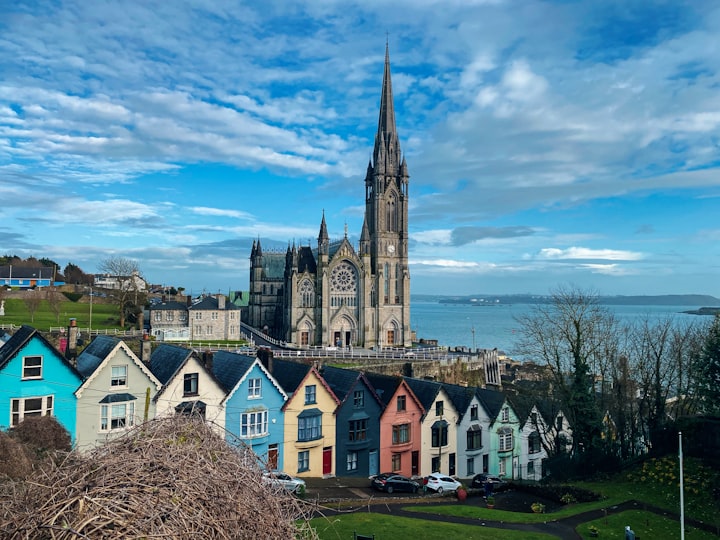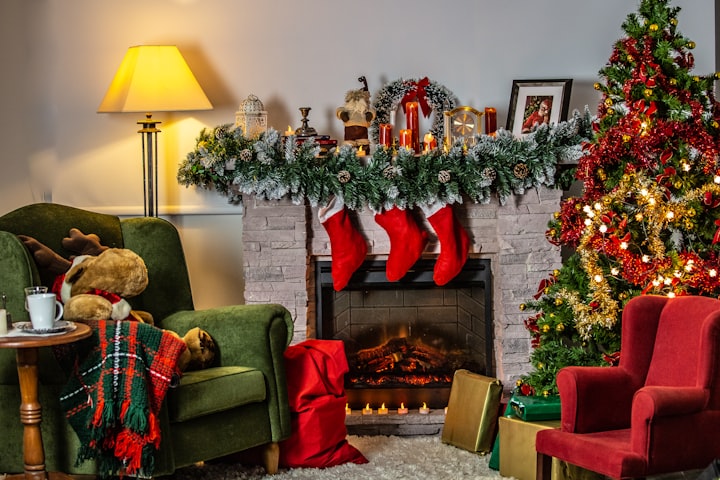Homecoming
A woman grapples with loss during "The Troubles" in 1970s Northern Ireland.

I returned home when platform shoes and bell bottoms were still in style, and the Stones belted out from every pub. In the long stretch of time that passed between my departure and return, I had evolved from an optimistic university graduate into a cynical journalist.
I considered this at the train station, clutching the hand of my four-year-old son Joel.
Contrary to my personal transformation, the train station remained exactly as it had been almost a century before, when my great-grandfather had been hired as the first conductor in our county. My da always boasted about this accomplishment to strangers on the train.
We lingered there for a moment, our backs to the unloading trains and our eyes fastened to the stretch of town, snaking up the hill and cradling a medieval stone-walled castle I scaled when I was a girl.
I closed my eyes, glimpsing turquoise tides spraying the rocks where the fishing boats were docked, directly behind the new Heritage Centre. My father, fluorescent coveralls clinging to his woollen garments, hollering out bass prices with his fingers hooked around rubbery scales and fins. The scent of cod as he hoisted me onto the boat, my oversized rubber boots dangling mere inches above the waves.
Joel’s voice pulled me from my thoughts. "Mum?"
I placed a hand on his head and guided him to the station exit near a bush of daisies badly in need of watering.
We trudged to a cab, paying the driver before sinking into the backseat. He appraised us from behind his tinted sunglasses, his thick accent reminding me how fervently I had tried to unlearn mine.
The air inside was surprisingly humid for an Irish spring, though strangely comfortable, tempting me to reminisce once more.
The ghosts of my past were obscured in the rearview of the cab, though I could still make out their contours. The playground with the indigo swings. The local pub. The farm that belonged to my long-deceased grandparents, where they spent a lifetime tending to the land. I worked for them in the summers, selling everything from apple tarts to goat milk and saving my share of the profit for university tuition.
We disembarked from the cab outside of the boardinghouse: a whitewashed abode with a bloom of ivy traversing across the side. A knock summoned an elderly woman to the door, a gaudy pink housecoat encompassing her broad but tiny frame, the nauseating colour dissolving into ruddy flesh.
She was a striking woman, with high cheekbones and intense green eyes. I could tell she had been quite the beauty in her day.
“Mrs. O’Connor?” I wiped my palm against the skirt of my calico dress.
Mrs. O’Connor wordlessly appraised my earrings and embroidered tote bag, her cool gaze warming at Joel cowering behind my elbow.
“I called ahead to request a room. My name is Katharine Price.”
“Tis a British surname?” Mrs. O’Connor speculated, angling her head to inspect me more thoroughly.
“My married name.” I explained curtly.
My father’s pained expression rose in my memory, his back bent over a knotted fishing net. My breath catching in my throat as I prayed for his blessing, or even just a nod of acknowledgement. The veins in his neck swelling like crimson cords as I extended my ringed hand to him.
Mrs. O’Connor bristled, her brows arching. “Come in, then. Take off your shoes. I spent all yesterday morn cleaning the carpets and polishing the floors.”
Easing out my sandals, I felt the roughness of my calloused feet against the smooth floor. No matter how many years had passed labouring over manuscripts and articles in my office cubicle, the childhood scars of beach-combing for shiny ocean treasures had remained, though always concealed beneath thick stockings and suede boots.
Mrs. O’Connor led us through a winding hallway, plastered with Celtic poems, nationalistic memorabilia and pearly white Catholic figurines, items my father would’ve patriotically saluted.
Where the hallway narrowed, there was a tidily kept bedroom with a circular window overlooking the garden. Swatches of paint coated the walls: pink that rivalled the colour of Mrs. O’Connor’s housecoat.
“This is your room.” Mrs. O’Connor gestured to the chamber, her hand withered. I noticed she pronounced every syllable with extreme attention. “Put your bags down and follow me to dinner.”
“Can’t we freshen up first?” I demanded. “The trip was long and we haven’t yet rested.”
I glared down at Mrs. O’Connor from the angle my tall stature provided. A lifetime of relentless teasing had produced a sense of pride in my height. Even if girls on the schoolyard had provoked me with insults, they never dared challenge me to a physical fight. I felt the same pride staring down at Mrs. O'Connor.
Mrs. O’Connor ignored my irritation, her eyes sending daggers. “You'll rest later. The dinner is getting cold, and you were more than an hour late.”
Joel pressed into my side, his eyes pleading. “Please Mum? I’m so hungry.”
I ignored Mrs. O'Connor, leaning down to kiss Joel on the head. "Yes, my love. We'll eat now and rest later."
After venturing downstairs, we were seated around a narrow dining table garnished with steaming plates of potatoes, gravy, squash, and chicken. On a side table sat every dessert imaginable.
No matter what I made of Mrs. O’Connor, she certainly knew how to prepare a meal.
“Ye live in Belfast long, Mrs. Price?” Mrs. O’Conner questioned halfway through her bite of soda bread.
“I was there for work.”
Rain began thudding on the roof above us.
Mrs. O’Connor spooned some more chicken onto Joel’s plate, and I nudged his arm to thank her. I wouldn't let the strange animosity building between us prevent my son from learning manners.
Mrs. O’Connor’s eyes gathered mist. “My youngest lived in Belfast. He was a bright young lad, like yours.”
Mrs. O’Connor took a moment to compose herself, drawing in a breath. Her eyes flew to me, hard and accusatory. “Sean was minding his own business. He came across a group of Irish protestors. Then, the Brits fired their bullets. Murdered them right there, in cold blood.”
~~~
That night, the rain started again, drawing me out of an agitated slumber.
A headache gathered between my temples. I took an aspirin, then another—until I fell into an unsettled sleep.
A shot fired.
I opened my eyes and see a sea of blood, pooling at my ankles and staining my nightgown.
My husband was beside me, his arms thick around my waist as he screamed at me to run. We dodged shards of glass and pieces of cement, the building we had first met in as young journalists crumbling. The stale taste of smoke stung my mouth as we toppled over to shield ourselves from the next blow.
My vision blurred, but I could still see tangerine flames splitting the darkness, heat encroaching. The wild keening of ambulances followed, then the chill of canvas as my frame was lifted onto a stretcher. I heard myself yelling for Michael and words of a prayer I had learned as a child.
A blast of noise disarmed my nightmare.
I screamed.
“Joel?” I unpeeled the covers from my clammy skin and glanced to my side.
His cot was empty, littered only with a chocolate bar wrapper and teddy bear.
“Joel!” I called again, my sanity waning.
My pulse pounding in my ears, I tripped down the stairs, past the Celtic poems and portraits of famed Irish Catholic emancipators. Regaining my balance, I stormed into the living room, my voice breathless. “What’s going on here?”
Mrs. O’Connor appeared in my trajectory, her lips curved into an uncharacteristic smile. “He’s here. Couldn’t sleep, poor thing. So I made him a cup of tea.”
Joel reached for me. His eyes gleamed the same cobalt blue his father’s had. “Mummy, I’m alright. Mrs. O’Connor sang me a lullaby and gave me some tea.”
“Go to bed, Joel. Now.” I commanded, the perfume of soda bread and brown sugar wafting around me. I was still shaking.
Mrs. O’Connor steadied herself against the sofa, hugging her rose housecoat closer as my son trotted upstairs. “Please, don’t be upset, Mrs. Price. Have some tea.”
She whirled around to pour a cup, her fingers trembling as she presented it to me.
I stepped back, my lip jutting. “Why should I trust you? You’ve been nothing but cruel to us today.”
Mrs. O’Connor ceased her pouring.
The pale lines along her mouth softened. “Your son told me about his father. I was cruel. I am very sorry.”
I remembered the last time I saw Michael. I called out for him in the rubble, only to realize he was always beside me; his colourless skin dappled with red, distorted by smoke. His hand clutching mine.
Tears stung my cheeks, compromising the composure I had forced myself to keep around my son.
“Cry, dearie. There’s no weakness in crying.” Mrs. O’Conner consoled, using the sleeve of her housecoat to wipe the tears from my face.
About the Creator
Ilana Quinn
I am a student who loves writing about history, travel, faith and life experiences. Feel free to check out more of my writing at https://linktr.ee/ilanaquinn :)






Comments
There are no comments for this story
Be the first to respond and start the conversation.